Related Research Articles
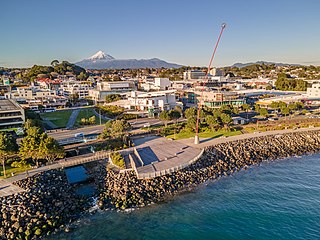
New Plymouth is the major city of the Taranaki region on the west coast of the North Island of New Zealand. It is named after the English city of Plymouth, in Devon, from where the first English settlers to New Plymouth migrated. The New Plymouth District, which includes New Plymouth City and several smaller towns, is the 10th largest district in New Zealand, and has a population of 88,900 – about two-thirds of the total population of the Taranaki Region and 1.7% of New Zealand's population. This includes New Plymouth City (59,600), Waitara (7,550), Inglewood (3,870), Ōakura (1,730), Ōkato (561) and Urenui (429).

Robert Charles Stuart was a New Zealand rugby union player and administrator. He was given a lifetime service award by the International Rugby Board immediately after the 2003 Rugby World Cup.

Graham Neil Kenneth Mourie is a former New Zealand All Black flanker and coach of the Hurricanes. He was one of the great All Black captains in the late 1970s and early 1980s. He was first selected for the All Blacks in 1976, captaining a second-string New Zealand team that toured South America. He was selected again for the All Blacks against the touring British Lions in 1977, and captained the side to France later that year, replacing Tane Norton as captain.
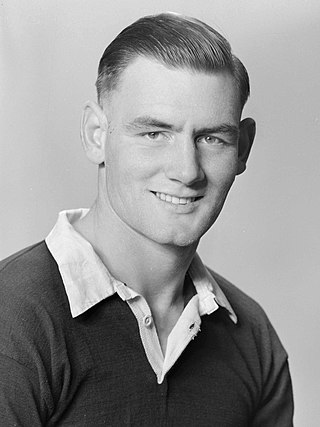
Sir Brian James Lochore was a New Zealand rugby union player and coach who represented and captained the New Zealand national team, the All Blacks. He played at number 8 and lock, as well as captaining the side 46 times. In 1999, Lochore was inducted into the International Rugby Hall of Fame.
David Steven Loveridge is an All Black of the late 1970s and early 1980s, known in his time as the greatest halfback in the world.
Paul Lane Penn was a New Zealand rugby union player, coach and administrator. A wing, Penn played for Taranaki and Wairarapa at provincial level, and later became coach of Wairarapa-Bush. He was an All Black selector from 1988 to 1991, and served as president of the New Zealand Rugby Football Union from 2001 to 2003.
Taranaki Rugby, previously the Taranaki Rugby Football Union, is the governing body for rugby union in Taranaki, New Zealand; Taranaki is a region of New Zealand that covers areas in the districts of New Plymouth and South Taranaki. Established in 1889, they represent the Mitre 10 Cup side, Taranaki Bulls, and Farah Palmer Cup side, Taranaki Whio. It is also affiliated with the Chiefs Super Rugby franchise. Their home playing colours are amber and black and they play their home games at TET Stadium & Events Centre in Inglewood.
Gavin Lyle Hill is a New Zealand former rugby union and rugby league footballer who played in the 1980s, 1990s and 2000s, and coached rugby union the 2000s. He resided in Wellington for 10-years before moving back to Auckland in 2008 to take a coaching position in the Air New Zealand Cup.

Ronald Morrison Barclay was a New Zealand politician of the Labour Party.
Howard Kevin Tamati, generally known as Howie Tamati, is a New Zealand politician and former professional rugby league footballer and coach who played for New Zealand. He is the cousin of fellow international Kevin Tamati.

John Joseph Stewart, generally known as JJ Stewart, was a New Zealand rugby union coach and administrator, and secondary school teacher. His obituary said that in 1973 when he took over as All Blacks coach, he was the right man at the right time for a team that was scarred and in crisis from a home loss to the British Lions in 1971, a controversial British tour in 1972–73 and a cancelled Springbok tour in 1973.
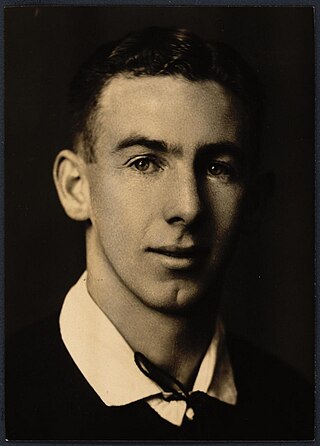
Mervyn Miles Nelson Corner was a New Zealand rugby union player, sporting administrator, and bank executive.
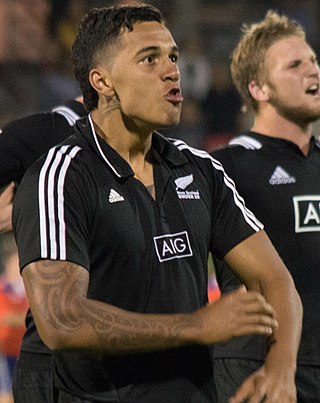
Sean Wainui was a New Zealand rugby union player. He played on the wing for provincial side Bay of Plenty, the Chiefs in Super Rugby, and for New Zealand's Māori international side the Māori All Blacks.
Thomas Clarence Morrison was a New Zealand rugby union player and administrator. A wing three-quarter, Morrison represented South Canterbury and Wellington at a provincial level. He was a member of the New Zealand national side, the All Blacks, on their 1938 tour of Australia, playing in five matches including three internationals. He later served on the executive of the New Zealand Rugby Union from 1946 to 1968, and was its chairman between 1962 and 1968. He was also a national selector between 1950 and 1956.
James Douglas Mackay was a New Zealand rugby union player. A wing three-quarter, Mackay represented Wellington at a provincial level, and was a member of the New Zealand national side, the All Blacks, in 1928. He played two matches for the All Blacks, scoring four tries, but did not appear in any internationals.
Peter Standish Burke was a New Zealand rugby union player, coach and administrator. A lock and number 8, Burke represented Bay of Plenty, Auckland and Taranaki at a provincial level, and was a member of the New Zealand national side, the All Blacks, in 1951, 1955 and 1957. He played 12 matches for the All Blacks including three internationals.
Charles Brown was a New Zealand rugby union player. A halfback, Brown represented Taranaki at a provincial level, and was a member of the New Zealand national side, the All Blacks, in 1913 and 1920. He played nine matches for the All Blacks including two internationals.
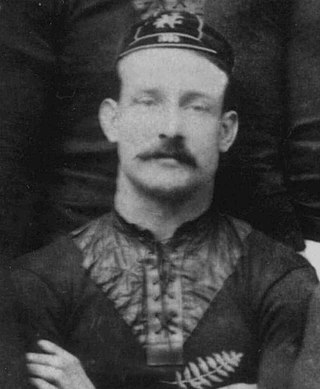
Alfred Bayly was a New Zealand rugby union player and administrator, and cricketer.
Harry Jonas "Simon" Mynott was a New Zealand rugby union player. A first five-eighth, Mynott represented Taranaki at a provincial level, and was a member of the New Zealand national side, the All Blacks, from 1905 to 1910. Mynott played 39 matches for the All Blacks, twice as captain. He played in eight internationals including the Match of the Century against Wales. In all he scored 58 points for the team, including 18 tries. Mynott went on to serve as a Taranaki selector between 1910 and 1914, and an All Black selector in 1913.

Thomas Neil Wolfe is a former New Zealand rugby union player, businessman, sports administrator and local politician. He played 14 matches, including six Tests, for the New Zealand national rugby team, the All Blacks, between 1961 and 1968. He was active in sports administration, including as president of the Taranaki Rugby Union and the Taranaki Jockey Club, and served as a New Plymouth district councillor between 2004 and 2010.
References
- 1 2 3 Knight, Lindsay. "Jack Sullivan". New Zealand Rugby Union. Retrieved 7 December 2014.
- ↑ Taylor, Alister; Coddington, Deborah (1994). Honoured by the Queen – New Zealand. Auckland: New Zealand Who's Who Aotearoa. p. 433. ISBN 0-908578-34-2.
- ↑ "No. 47420". The London Gazette (3rd supplement). 31 December 1977. p. 42.
- ↑ "Cemetery search". New Plymouth District Council. Retrieved 7 December 2014.